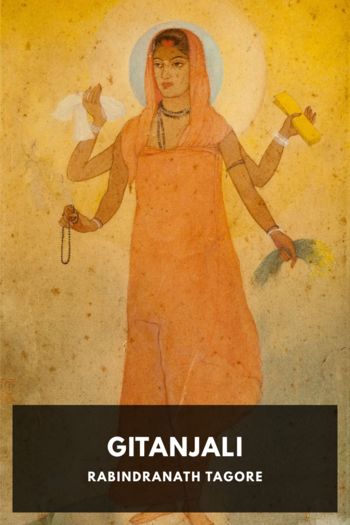My Reminiscences, Rabindranath Tagore [famous ebook reader .TXT] 📗

- Author: Rabindranath Tagore
Book online «My Reminiscences, Rabindranath Tagore [famous ebook reader .TXT] 📗». Author Rabindranath Tagore
There, where in the breast of limitless space clouds are laid to sleep,
I have built my house for thee, O Poesy!
At this time my reputation amongst literary critics was that of being a poet of broken cadence and lisping utterance. Everything about my work was dubbed misty, shadowy. However little I might have relished this at the time, the charge was not wholly baseless. My poetry did in fact lack the backbone of worldly reality. How, amidst the ringed-in seclusion of my early years, was I to get the necessary material?
But one thing I refuse to admit. Behind this charge of vagueness was the sting of the insinuation of its being a deliberate affectation—for the sake of effect. The fortunate possessor of good eyesight is apt to sneer at the youth with glasses, as if he wears them for ornament. While a reflection on the poor fellow’s infirmity may be permissible, it is too bad to charge him with pretending not to see.
The nebula is not an outside creation—it merely represents a phase; and to leave out all poetry which has not attained definiteness would not bring us to the truth of literature. If any phase of man’s nature has found true expression, it is worth preserving—it may be cast aside only if not expressed truly. There is a period in man’s life when his feelings are the pathos of the inexpressible, the anguish of vagueness. The poetry which attempts its expression cannot be called baseless—at worst it may be worthless; but it is not necessarily even that. The sin is not in the thing expressed, but in the failure to express it.
There is a duality in man. Of the inner person, behind the outward current of thoughts, feelings and events, but little is known or recked; but for all that, he cannot be got rid of as a factor in life’s progress. When the outward life fails to harmonise with the inner, the dweller within is hurt, and his pain manifests itself in the outer consciousness in a manner to which it is difficult to give a name, or even to describe, and of which the cry is more akin to an inarticulate wail than words with more precise meaning.
The sadness and pain which sought expression in the Evening Songs had their roots in the depths of my being. As one’s sleep-smothered consciousness wrestles with a nightmare in its efforts to awake, so the submerged inner self struggles to free itself from its complexities and come out into the open. These Songs are the history of that struggle. As in all creation, so in poetry, there is the opposition of forces. If the divergence is too wide, or the unison too close, there is, it seems to me, no room for poetry. Where the pain of discord strives to attain and express its resolution into harmony, there does poetry break forth into music, as breath through a flute.
When the Evening Songs first saw the light they were not hailed with any flourish of trumpets, but none the less they did not lack admirers. I have elsewhere told the story of how at the wedding of Mr. Ramesh Chandra Dutt’s eldest daughter, Bankim Babu was at the door, and the host was welcoming him with the customary garland of flowers. As I came up Bankim Babu eagerly took the garland and placing it round my neck said: “The wreath to him, Ramesh, have you not read his Evening Songs?” And when Mr. Dutt avowed he had not yet done so, the manner in which Bankim Babu expressed his opinion of some of them amply rewarded me.
The Evening Songs gained for me a friend whose approval, like the rays of the sun, stimulated and guided the shoots of my newly sprung efforts. This was Babu Priyanath Sen. Just before this the Broken Heart had led him to give up all hopes of me. I won him back with these Evening Songs. Those who are acquainted with him know him as an expert navigator of all the seven seas51 of literature, whose highways and byways, in almost all languages, Indian and foreign, he is constantly traversing. To converse with him is to gain glimpses of even the most out of the way scenery in the world of ideas. This proved of the greatest value to me.
He was able to give his literary opinions with the fullest confidence, for he had not to rely on his unaided taste to guide his likes and dislikes. This authoritative criticism of his also assisted me more than I can tell. I used to read to him everything I wrote, and but for the timely showers of his discriminate appreciation it is hard to say whether these early ploughings of mine would have yielded as they have done.
XXXIV Morning SongsAt the riverside I also did a bit of prose writing, not on any definite subject or plan, but in the spirit that boys catch butterflies. When spring comes within, many-coloured short-lived fancies are born and flit about in the mind, ordinarily unnoticed. In these days of my leisure, it was perhaps the mere whim to collect them which had come upon me. Or it may have been only another phase of my emancipated self which had thrown out its chest and decided to write just as it pleased; what I wrote not being the object, it being sufficient unto itself that it was I who wrote. These prose pieces were published later under the name of Vividha Prabandha, Various Topics, but they expired with





Comments (0)